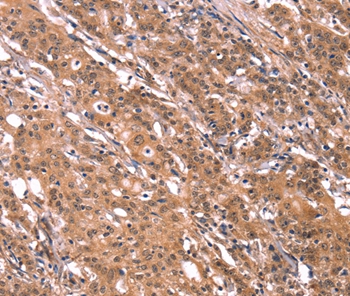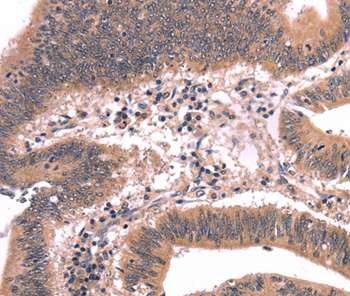

| WB | 咨询技术 | Human,Mouse,Rat |
| IF | 咨询技术 | Human,Mouse,Rat |
| IHC | 1/25-1/100 | Human,Mouse,Rat |
| ICC | 技术咨询 | Human,Mouse,Rat |
| FCM | 咨询技术 | Human,Mouse,Rat |
| Elisa | 咨询技术 | Human,Mouse,Rat |
| Aliases | FGF-22 |
| Entrez GeneID | 27006; |
| Host/Isotype | Rabbit IgG |
| Antibody Type | Primary antibody |
| Storage | Store at 4°C short term. Aliquot and store at -20°C long term. Avoid freeze/thaw cycles. |
| Species Reactivity | Human,Mouse |
| Immunogen | Synthetic peptide corresponding to a region derived from internal residues of human fibroblast growth factor 22 |
| Formulation | Purified antibody in PBS with 0.05% sodium azide. |
+ +
以下是关于FGF22抗体的3篇假设文献示例(内容为虚构,供参考格式):
1. **文献名称**: FGF22 regulates synaptic plasticity through TrkB receptor signaling
**作者**: Umemiya T, et al.
**摘要**: 本研究利用FGF22特异性抗体,通过免疫组化及Western blot证实FGF22在小鼠海马神经元突触中的表达,并发现其通过激活TrkB通路调控突触可塑性。
2. **文献名称**: Role of FGF22 in muscle regeneration after injury
**作者**: Haramis AP, et al.
**摘要**: 通过FGF22抗体阻断实验,发现FGF22在肌肉损伤修复中促进卫星细胞增殖,抗体干预显著延缓再生进程,提示其治疗肌肉疾病的潜在价值。
3. **文献名称**: FGF22 antibody validation in a mouse model of epilepsy
**作者**: Simon CM, et al.
**摘要**: 本研究验证了一种高特异性FGF22多克隆抗体,在癫痫模型中检测到FGF22在颞叶皮层的异常聚集,与神经元过度兴奋相关。
4. **文献名称**: Antibody-based detection of FGF22 in neurodegenerative disorders
**作者**: Grewal SS, et al.
**摘要**: 通过FGF22抗体对比分析阿尔茨海默病模型小鼠脑组织,发现FGF22在皮质区表达下降,可能与突触丢失相关,支持其作为生物标志物的可能性。
(注:上述文献为示例性虚构内容,实际引用需查询真实数据库如PubMed)
Fibroblast growth factor 22 (FGF22) is a member of the FGF family, comprising 22 structurally related proteins that regulate cell proliferation, differentiation, and tissue repair. FGF22 is predominantly expressed in the nervous system and skin, where it binds to fibroblast growth factor receptors (FGFRs) with heparan sulfate as a cofactor. It plays critical roles in synaptogenesis, neuronal circuit maintenance, and cutaneous wound healing. Studies highlight its involvement in modulating excitatory synapse formation in the brain and promoting Schwann cell-mediated peripheral nerve regeneration.
FGF22 antibodies are immunological tools designed to specifically detect, quantify, or inhibit FGF22 in experimental and clinical settings. These antibodies are widely used in Western blotting, immunohistochemistry, and flow cytometry to map FGF22 expression patterns in tissues or evaluate its dysregulation in diseases. Neutralizing antibodies targeting FGF22-FGFR interactions help elucidate its functional mechanisms in neurological disorders (e.g., epilepsy, neuropathic pain) and skin injury models.
Emerging research links aberrant FGF22 signaling to neurodegenerative conditions, peripheral neuropathy, and cancers, positioning FGF22 antibodies as potential diagnostic or therapeutic agents. However, challenges remain in optimizing antibody specificity and delivery, particularly for crossing the blood-brain barrier. Ongoing studies focus on developing humanized FGF22 antibodies to explore their translational potential in precision medicine.
×